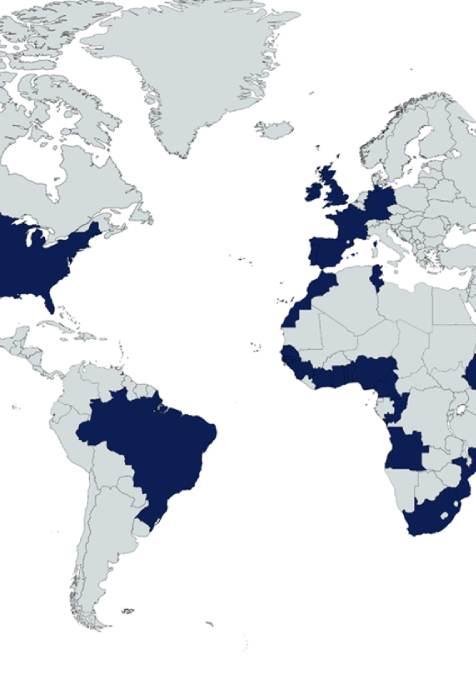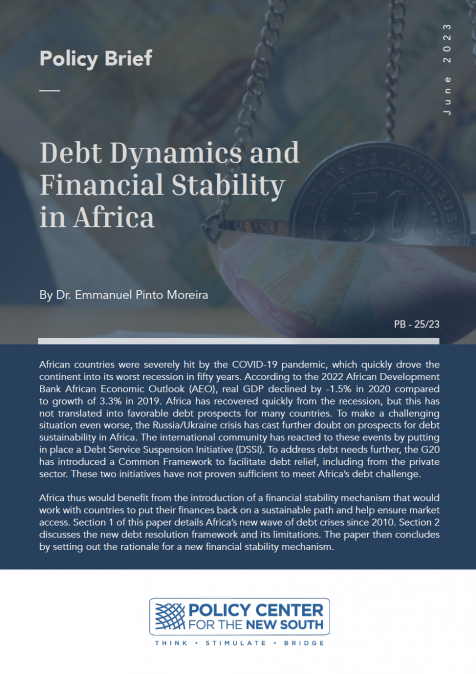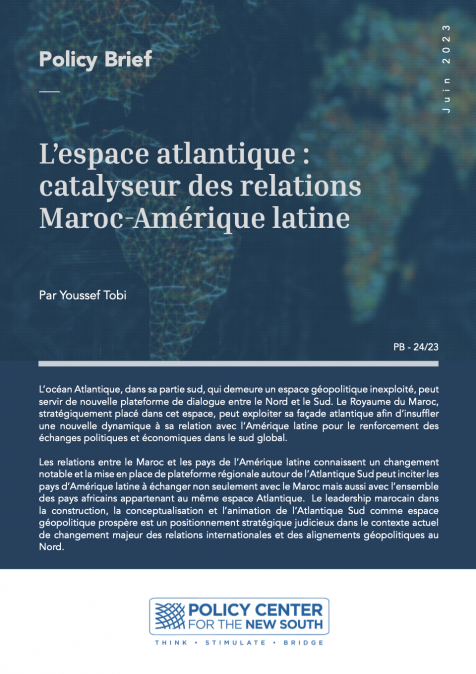Président
- Indermit Gill, économiste en chef et premier vice-président pour l'économie du développement, Groupe de la Banque mondiale
Présentateur
- Montek Singh Ahluwalia, ancien vice-président de la Commission de planification de l'Inde
Discutants
- Rim Berahab, économiste en chef, Policy Center for the New South (PCNS)
- Ingrid Gabriela Hoven, directrice générale, GIZ - Agence allemande de développement
- Lord Nicholas Stern, professeur et titulaire de la chaire IG Patel d'économie et de gouvernement, London School of Economics (LSE)
- Hasan Tuluy, associé principal, Centennial Group
RELATED CONTENT
-
AuthorsJune 6, 2023African countries were severely hit by the COVID-19 pandemic, which quickly drove the continent into its worst recession in fifty years. According to the 2022 African Development Bank African Economic Outlook (AEO), real GDP declined by -1.5% in 2020 compared to growth of 3.3% in 2019. Africa has recovered quickly from the recession, but this has not translated into favorable debt prospects for many countries. To make a challenging situation even worse, the Russia/Ukraine crisis has ...
-
 AuthorsJune 5, 2023Le propos semblera tautologique à beaucoup, mais les géographies ne sont pas - seulement - des œuvres de la Création, ou le produit du hasard et des accidents de la vie de la Terre. Elles sont, presque plus fondamentalement, pourrait-on dire, le produit du regard actif de l’Homme, qui, porté sur elles, les façonne, par le travail, et par la projection de représentations mentales dans la matière. Cette capacité de l’Homme à (se) projeter (par) son regard dans l’espace visibilise les ...
AuthorsJune 5, 2023Le propos semblera tautologique à beaucoup, mais les géographies ne sont pas - seulement - des œuvres de la Création, ou le produit du hasard et des accidents de la vie de la Terre. Elles sont, presque plus fondamentalement, pourrait-on dire, le produit du regard actif de l’Homme, qui, porté sur elles, les façonne, par le travail, et par la projection de représentations mentales dans la matière. Cette capacité de l’Homme à (se) projeter (par) son regard dans l’espace visibilise les ... -
AuthorsJune 2, 2023L’océan Atlantique, dans sa partie sud, qui demeure un espace géopolitique inexploité, peut servir de nouvelle plateforme de dialogue entre le Nord et le Sud. Le Royaume du Maroc, stratégiquement placé dans cet espace, peut exploiter sa façade atlantique afin d’insuffler une nouvelle dynamique à sa relation avec l’Amérique latine pour le renforcement des échanges politiques et économiques dans le sud global. Les relations entre le Maroc et les pays de l’Amérique latine c ...
-
By Suhail Inyatullah & Soukaina El MajidiJune 02, 2023In this podcast, we discuss how artificial intelligence and digital development contribute to more accurate predictions and scenario building during foresight studies. In fact, foresight ...
-
AuthorsJune 1, 2023This Policy Brief examines the current banking crisis in the United States and its implications for Africa. Many studies have pointed out the main factors responsible for this crisis, including poor risk-management practices in the failed banks, the sector’s weak regulatory structure, and the failure of bank supervisors. However, a key factor that has contributed to the extent and speed of the crisis is the U.S. Federal Reserve’s (Fed) policy actions, including the elimination of re ...
-
May 30, 2023أعلنت الهيئة العليا للانتخابات في تركيا إعادة انتخاب الرئيس رجب طيب أردوغان لولاية جديدة بعد فوزه في الجولة الثانية من انتخابات الرئاسة حيث حصل على 52.14% من أصوات الناخبين أمام منافسه السيد كمال كليجدار أوغلو الذي حصل على 47.86%. خلال الحملة الانتخابية، سجلت الانتخابات التركية اهتمامًا...
-
-
May 30, 2023Depuis 2020, le Policy Center for the New South, le Programme des Nations unies pour le développement (PNUD) et la Banque mondiale ont lancé l'initiative « Parlons développement », qui consiste en une série de réflexions collectives sur les grands enjeux du développement durable. Cette ...
-
 AuthorsPierre SauvéMay 29, 2023Morocco has made important strides in reducing poverty in the last three decades, thanks in large part to trade and industrial policies aimed at durably inserting the country into world flows of goods, services, and cross-border investment. Since 1992, per capita incomes have tripled (in current US$), contributing to a threefold drop in the Kingdom’s poverty headcount. The country of 37 million features consistently as one of the better-performing and more stable economies in the No ...
AuthorsPierre SauvéMay 29, 2023Morocco has made important strides in reducing poverty in the last three decades, thanks in large part to trade and industrial policies aimed at durably inserting the country into world flows of goods, services, and cross-border investment. Since 1992, per capita incomes have tripled (in current US$), contributing to a threefold drop in the Kingdom’s poverty headcount. The country of 37 million features consistently as one of the better-performing and more stable economies in the No ... -
AuthorsMay 26, 2023The energy and ecological transition (EET) is inevitable, desirable, and now accepted worldwide. But how this transition will be financed remains highly uncertain. This Policy Paper analyzes the financing needs and reviews the different possible financial channels. Some avenues have already been launched, and procedures and instruments are being put in place, but all of this remains insufficient. Many solutions will have to be combined, and these will require financial innovations, ...







